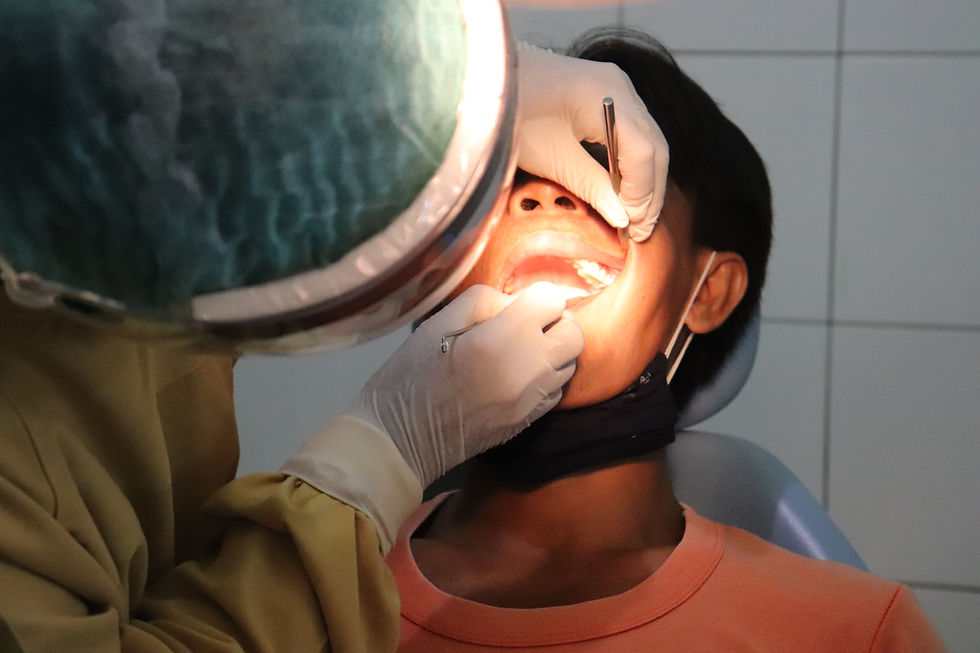Why Do Cavities Happen and How Can You Prevent Them?
- Enrich Health Biotech

- Mar 21
- 4 min read
Updated: 6 days ago

Cavities, known as dental caries or tooth decay, are among the most prevalent dental issues faced by individuals across all age groups. These small holes are the result of damage to the tooth's hard surface caused by acids produced by bacteria in the mouth. Understanding the causes of cavities and how to prevent them is vital for maintaining excellent oral health.
What Are Cavities?
Cavities are small openings that develop in the hard surface of teeth. The process starts with the demineralization of tooth enamel, which decreases its strength and makes it more susceptible to decay. If left untreated, cavities can worsen, leading to severe dental complications, such as infections or even tooth loss. According to the CDC, about 26% of adults have untreated tooth decay, highlighting the importance of prevention.
Causes of Cavities
Bacteria and Plaque Build-Up
The main reason for cavity formation is harmful bacteria that reside in dental plaque. Plaque is a thick, sticky film that builds up on teeth when sugars and starches from food are left unremoved. A study found that the presence of specific bacteria, like Streptococcus mutans, is directly linked to increased cavity risk. These bacteria feast on sugars, releasing acids that gradually erode tooth enamel.
Diet Choices
The types of food you consume have a direct impact on cavity formation. A diet high in sugary snacks, sodas, and processed carbohydrates can significantly increase the likelihood of developing cavities. Not only does the quantity of sweets matter, but so does the frequency of consumption. Research shows that teenagers who snack on sugary foods more than three times a day have twice the risk of cavities compared to those who limit sugary snacks to once daily.
Poor Oral Hygiene
Irregular brushing and flossing promotes plaque accumulation on teeth. Poor oral hygiene not only leads to cavities but can also result in gum disease and other oral health problems. It is crucial to clean all tooth surfaces, especially areas between teeth, where plaque tends to accumulate more easily.
Saliva and Its Role
Saliva acts as a natural defense against cavities by neutralizing acids produced by bacteria. Factors that reduce saliva flow, like certain medications or health conditions, can increase cavity risk. Staying hydrated and consuming crunchy fruits and vegetables can boost saliva production and help wash away food particles.
Prevention Strategies
Maintain Good Oral Hygiene
Implementing a solid oral hygiene routine is key in preventing cavities. Brush your teeth twice a day with fluoride toothpaste and floss daily to eliminate plaque. Fluoride plays a significant role in remineralizing weakened enamel, potentially reversing early signs of decay.
Balanced Diet
A balanced diet greatly decreases the chances of developing cavities. Try to minimize sugary snacks, focusing on healthier options like apples, carrots, or nuts. Incorporating dairy products, which are high in calcium and phosphate, can help strengthen teeth and support oral health. A study showed that individuals who consume more dairy have a lower incidence of cavities.
Regular Dental Check-Ups
Regular dental check-ups and cleanings are crucial for early cavity detection. Dentists can perform professional cleanings to remove plaque and tartar that regular brushing may miss. They also have the option to apply sealants or fluoride treatments, enhancing your teeth's protection. Visiting the dentist at least twice a year helps catch problems before they escalate.
Use Dental Sealants
Dental sealants are thin coatings applied to the chewing surfaces of back teeth. They create a protective layer, effectively blocking food particles and bacteria. Sealants can reduce the risk of cavities by nearly 80% in children, making them an excellent preventive measure.
Limit Snacking
Reducing the frequency of eating snacks can decrease acid production in the mouth. If you must snack, opt for healthier choices such as fresh fruits, vegetables, or cheese, which tend to have less impact on tooth decay.
Recognizing Early Signs of Cavities
Spotting cavities early is crucial for effective treatment. Watch out for signs such as increased tooth sensitivity, discomfort when biting, or visible dark spots on your teeth. If you notice any of these symptoms, consult your dentist as soon as possible. Early intervention can save you from more serious issues down the line.
Treatment Options for Cavities
If you develop a cavity, timely treatment is key. The treatment approach depends on the extent of the decay:
Fillings: For small to moderate cavities, the decay is removed, and the tooth is filled with materials like composite resin or amalgam. This procedure is typically completed in one visit.
Crowns: Extensive decay may necessitate a crown to restore the tooth's shape and protect its structure.
Root Canals: If the decay reaches the tooth's pulp, a root canal may be required to remove infected tissue and save the tooth.
Preventing New Cavities: After treatment, continual good oral hygiene and regular dentist visits are essential to prevent new cavities from forming.
Final Thoughts
Cavities are a widespread dental issue that can greatly affect your oral health. By understanding their causes, identifying risk factors, and employing effective preventive measures, you can maintain a healthy, cavity-free smile. Regular brushing, mindful eating choices, and consistent dental visits are your best defenses. Remember, taking proactive steps now is far easier and less costly than dealing with cavities later. Start caring for your teeth today for a healthier tomorrow.
%20(2).png)

Comments